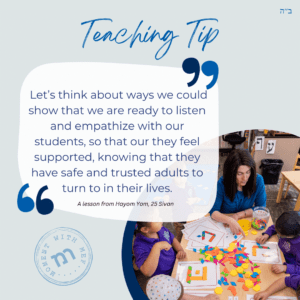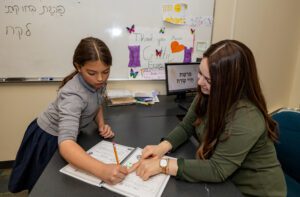 As teachers we’re in the best position to show our students that we’re on their team. How can we listen to our students non judgmentally, and make more time for listening to them in the classroom?
As teachers we’re in the best position to show our students that we’re on their team. How can we listen to our students non judgmentally, and make more time for listening to them in the classroom?
In the Hayom Yom of 25 Sivan, the Rebbe quotes from Mishlei: דְּאָגָה בְלֶב אִישׁ יַשְׁחֶנָּה that if there’s a worry in a person’s heart he should minimize it, which means to ‘cast it away” or discuss it with a trusted friend. The Tzemach Tzedek clarified that the trusted friend is one who may be separate physically, but unites his heart with the person who confides in him.
A story about the child’s play of the Rebbe Rashab when he was young, teaches us what it means to listen:
When the Rebbe Rashab was a child, he played Rebbe-Chossid with his brother, R’ Zalman Aharon. The Rebbe Rashab pretended to be a brokenhearted Chossid turning to his Rebbe for advice in his Avodas Hashem, and R’ Zalman Aharon played the role of Rebbe, giving guidance to this Chossid. Their mother, Rebbetzin Rivka, observed that the Rebbe Rashab didn’t listen to the advice that his brother gave him while they were playing their game.
 “He isn’t going to be a Rebbe,” the Rebbe Rashab explained. “When someone turns to a Rebbe for advice, a Rebbe first sighs in understanding, and only afterwards, after his advice. My brother didn’t sigh, but answered right away.”
“He isn’t going to be a Rebbe,” the Rebbe Rashab explained. “When someone turns to a Rebbe for advice, a Rebbe first sighs in understanding, and only afterwards, after his advice. My brother didn’t sigh, but answered right away.”
Whether we teach young children or teenagers, we have students who turn to us to share what is on their hearts and in their minds. Let’s use the words of the Rebbe Rashab as a test to see if we really listen. Let’s empathize before sharing our two sense and guidance, so that our students feel supported, knowing that they have safe and trusted adults to turn to in their lives. As we know, education is prevention, and showing that we care through actively listening and tuning into the signs and signals of our students, we can be part of raising a generation of joyful and supported students.





